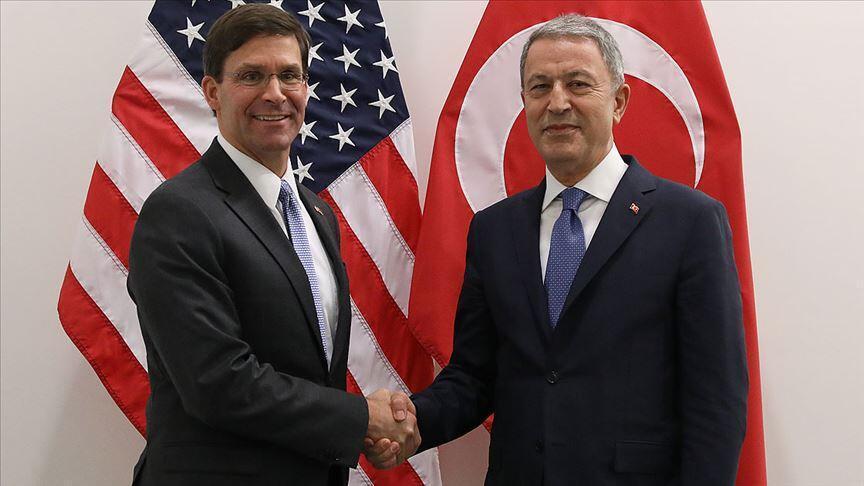
Top defense officials of Turkey and the U.S. discussed a planned safe zone in Syria over the phone late on Oct. 3.
According to the Turkish Defense Ministry, Hulusi Akar and his U.S. counterpart Mark Esper addressed the efforts for the establishment of the proposed safe zone in northern Syria.
During the phone conversation, Akar recalled that Turkey wants a 30-kilometers-wide safe zone to be set up east of the Euphrates River in Syria.
If there is stalling or a delay in the process to set up the safe zone, the joint efforts will be ended, Akar said.
He also said that Turkey will not allow a terror corridor to be established in the country's southern part.
Turkish and U.S. military officials agreed on Aug. 7 to set up a safe zone in northern Syria and develop a peace corridor to facilitate the movement of displaced Syrians who want to return to their homeland.
Turkish leaders have said the U.S. is not doing enough to establish the zone, which could house some 2-3 million Syrians who fled the Syrian civil war since 2011.
Turkey currently hosts some 3.6 million Syrian refugees, more than any other country in the world. Ankara has so far spent $40 billion for the refugees, according to official figures.
Turkey also reiterated its call on the U.S. to stop providing aid for PKK/YPG/PYD terror group, especially arms and ammunition support, the ministry's statement said.
The phone call also underlined that Turkey want the ensure the security of the religious and ethnic group, including the Kurds, Arabs,
Christians, living in the region, as well as its security.
Turkey's ultimate aim is to rid the northern Syria of any terrorist group, such as ISIL and PKK, according to the statement.
In its more than 30-year terror campaign against Turkey, the PKK -- listed as a terrorist organization by Turkey, the U.S. and the EU -- has been responsible for the deaths of some 40,000 people, including women, children, and infants.
The terrorist YPG is the PKK's Syrian branch.
The YPG/PKK and PYD/PKK are Syrian branches of the terrorist PKK and the focus of Turkey's successful counter-terrorist Operation Olive Branch in Afrin, Syria, near the border with Turkey.
US Air Force general commends Turkish military
A top U.S. military commander on Oct. 3 commended Turkish military, saying trust in Turkey in military perspective remains strong as ever.
Speaking at a press conference at the Pentagon, U.S. Air Force. Gen. Tod Wolters, NATO's supreme allied commander for Europe, said the military-to-military relationship with Turkey is palpable today as it has been in the past.
"One of the things that we deeply appreciate in the relationship is the fact that when we, U.S. service members in our act, from an exercise standpoint with our Turkish counterparts, they treat us as brothers in arms, they truly treat you as a bloodline," said Wolters.
"So, the trust that exists from a military to military perspective is as strong as it has been in the past," he added.
Wolters said he is tasked by U.S. leadership to "make sure that I can do all that I can in my military reign, to keep the relationship sound."
"And obviously, as we sit today, turkey is very, very important partner from a NATO perspective. And what they do to enhance the security disposition on the continent remains very, very productive," he added.
On a question about impact of Turkey's removal from F-35 jet program by NATO, the U.S. general echoed NATO Secretary-General Jens Stoltenberg, saying the alliance is a family and may have disagreements.
"And we have to wake up every morning and we have to find a way to get to work in the rain. And, and quite honestly, this activity is one of those things that we have a disagreement on, but we continue to put one foot in front of the other and march forward," he said.
U.S. President Donald Trump has repeatedly voiced reluctance to penalize Turkey for its purchase of Russia’s S-400 missile defense system -- doing so when announcing Ankara's removal from the F-35 Joint Strike Fighter program in July.
The Trump administration has maintained that the S-400 system could expose the advanced fighter to possible Russian subterfuge and is incompatible with NATO systems.
Turkey, however, counters that the S-400 would not be integrated into NATO systems and would not pose a threat to the alliance.
Wolters said Turkey remains a "very, very important" NATO ally. "We'll see what happens over the course of the time with respect to the stance that the United States has taken and Turkey has taken with respect to the co-location of S-400 and F-35," he said.